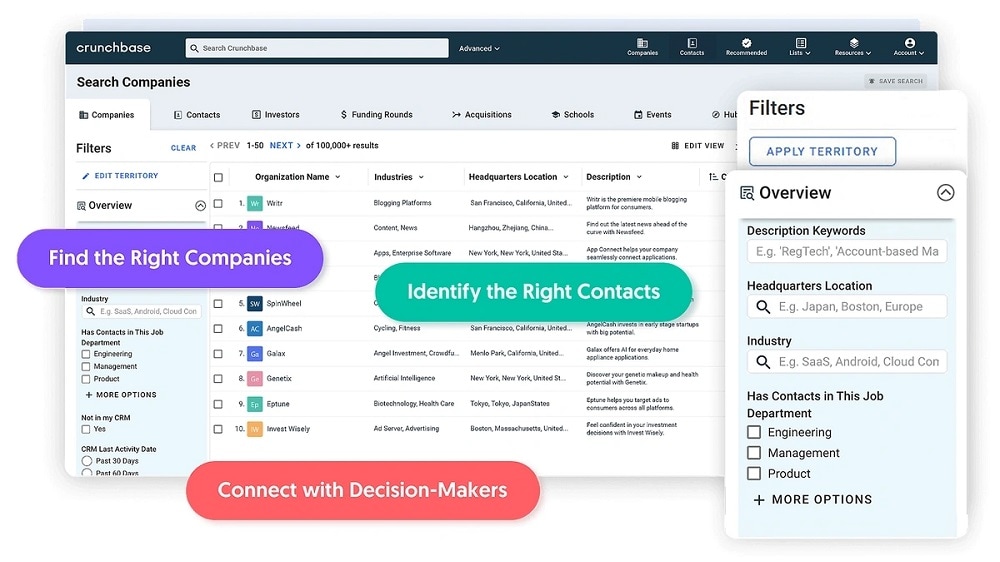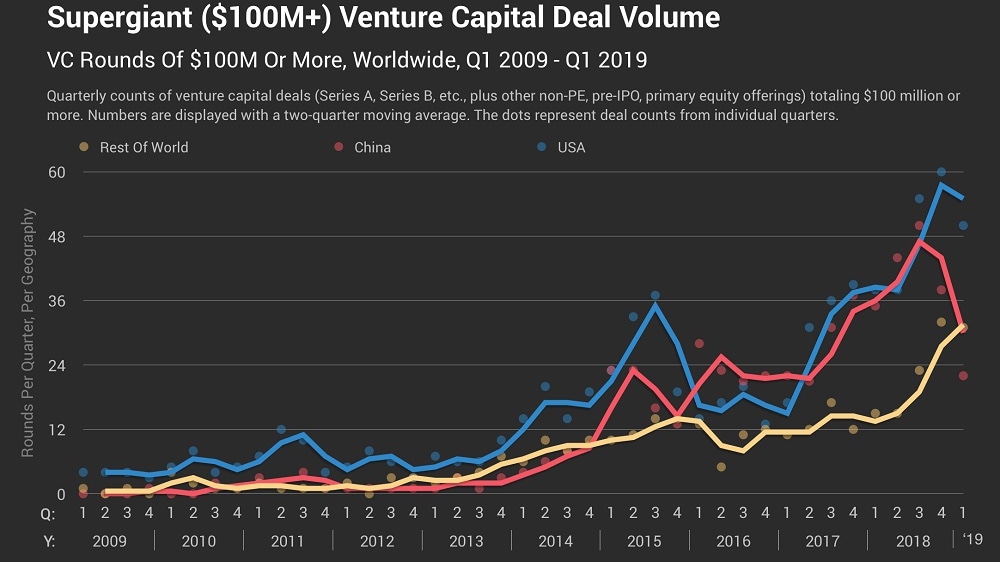Crunchbase vs ZoomInfo: Choosing the best business intelligence tool for your data-driven decisions
- 01Crunchbase vs ZoomInfo: overview
- 02What's the difference between Crunchbase and ZoomInfo?
- 03Crunchbase pros and cons
- 04ZoomInfo pros and cons
- 05Crunchbase compared to ZoomInfo
- 06ZoomInfo compared to Crunchbase
- 07Features comparison
- 08Crunchbase vs ZoomInfo: Which is the best for your business?
- 09Promotions on Prospecting software
- 10Alternatives to Crunchbase & ZoomInfo
Save up to $1,176 on Crunchbase
Crunchbase
20% off for 1 year
Save up to $1,176 on Crunchbase
Crunchbase
20% off for 1 year
In the fast-paced world of business intelligence and data analytics, choosing the right tool is crucial for leveraging the power of data to drive business strategies. Crunchbase and ZoomInfo emerge as prominent contenders in this field, each offering unique strengths that cater to various business intelligence requirements.
In this discussion, we will explore the key functionalities, benefits, drawbacks, and significant differences between Crunchbase and ZoomInfo. This analysis will guide you in selecting the most suitable business intelligence platform for your data-centric initiatives, whether your focus is on market research, lead generation, or investment scouting.
Crunchbase vs ZoomInfo: overview
Crunchbase and ZoomInfo stand out as two of the leading platforms in the business intelligence and data management sector, each with distinct features and benefits tailored to meet the needs of different user profiles.
Crunchbase is particularly acclaimed for its depth of information on startups, venture capital (VC) activity, and emerging industries. It serves as a powerful tool for businesses and investors seeking detailed insights into company funding, industry trends, and networking opportunities. In contrast, ZoomInfo provides an extensive directory of businesses and professionals, which is a goldmine for sales and marketing teams looking to generate leads and build detailed customer profiles.
This article will delve into the core features, advantages, disadvantages, and distinct differences between Crunchbase and ZoomInfo. We aim to provide a detailed comparison to assist you in choosing the right platform that aligns with your specific business intelligence needs, whether for market research, lead generation, or strategic investment.
What's the difference between Crunchbase and ZoomInfo?


Crunchbase and ZoomInfo are both prominent data intelligence platforms, but they serve users’ needs in different ways. Crunchbase is primarily recognized for its comprehensive information on startups, venture capital (VC) firms, and individual investors. This makes it particularly suitable for entrepreneurs seeking investment, VCs tracking investment opportunities, and corporates looking for acquisition targets. Its interface is designed to provide deep insights into the startup ecosystem, offering data on recent funding rounds, key investors, and industry trends.
On the other hand, ZoomInfo is designed with sales and marketing professionals in mind. It provides access to a vast database of businesses and business professionals, which is ideal for B2B sales teams looking for leads, market researchers conducting industry analysis, and recruitment teams searching for potential candidates. ZoomInfo excels in its real-time business data and insights, aiding in targeted marketing and sales efforts with its direct dial phone numbers and email addresses.
The difference in focus translates to the type of integrations each platform offers. Crunchbase integrates well with CRM systems like Salesforce to track investment opportunities, while ZoomInfo integrates with sales engagement platforms and marketing automation tools to optimize lead generation processes.
Another significant difference lies in the pricing models of the two platforms. Crunchbase operates on a subscription model, offering different tiers depending on access level and data needs. It provides a basic free tier with limited data access, which can be a great starting point for smaller entities. ZoomInfo, however, is known for its custom pricing model, which can be tailored according to the scale and specific requirements of the business, potentially making it a costlier option, but one that is more precisely aligned with a company’s particular needs.
Lastly, while both platforms offer customer support, the scope and delivery can differ. Crunchbase provides support through online forms and a help center, whereas ZoomInfo offers a more personalized approach with account managers and customer success teams, ensuring users get the most out of the platform’s capabilities.
Crunchbase pros and cons
What are the advantages of Crunchbase?
- Startup-focused data: Crunchbase is an excellent resource for detailed information on startups, VC firms, and funding rounds, making it ideal for investors and entrepreneurs.
- User-friendly interface: The platform is known for its clean, intuitive design, making navigation and data retrieval straightforward.
- Quality of information: The data on Crunchbase is generally of high quality, with regular updates and contributions from a community of users.
- Networking capabilities: Users can leverage Crunchbase to connect with founders and investors, which can be beneficial for networking and business development.
- Free access option: Crunchbase offers a basic free version, allowing users to access a wealth of information without any financial commitment, which is great for individuals or small startups.
What are the disadvantages of Crunchbase?
- Limited Scope for Non-Startups: For professionals outside of the startup ecosystem, such as those in established industries or B2B sales, Crunchbase may not provide comprehensive data.
- Depth of data behind paywall: While there is a free tier, more in-depth data and analytics features require a paid subscription, which can be costly.
- Data reliability: Since the platform relies partly on self-reported data, there can be issues with the accuracy or timeliness of some entries.
- Limited global reach: Crunchbase tends to be more U.S.-centric, and while it's expanding, its international data might not be as robust as its domestic data.
- Basic analytical tools: Compared to other platforms, Crunchbase's in-built analytical tools are relatively basic, which may require users to conduct further analysis externally.
Compare Crunchbase to other tools
ZoomInfo pros and cons
What are the advantages of ZoomInfo?
- Extensive B2B database: ZoomInfo boasts a vast directory of company and contact information, which is highly valuable for sales and marketing professionals.
- Advanced search filters: The platform offers advanced search capabilities, enabling users to find highly targeted leads based on a wide range of criteria.
- Direct contact information: It provides direct phone numbers and email addresses, which can significantly increase the efficiency of outreach campaigns.
- Integration with sales and marketing tools: ZoomInfo integrates well with various CRM and marketing automation platforms, enhancing lead generation and outreach strategies.
- Real-time data updates: The platform's data is continuously updated, ensuring that users have access to the most current information available.
What are the disadvantages of ZoomInfo?
- Cost prohibitive for some users: ZoomInfo can be expensive, especially for small businesses or individual users, as it typically requires a custom quote based on usage.
- Complexity for new users: The wealth of features and data can be overwhelming for new users, with a steeper learning curve to utilize the platform effectively.
- Data privacy concerns: The collection and use of personal contact information can raise privacy concerns, which may deter some potential users.
- Accuracy of data: While ZoomInfo updates its data regularly, the accuracy of such a vast database can be inconsistent, with some contacts being out-of-date.
- Limited free or trial options: Unlike some competitors, ZoomInfo doesn't offer a free version and its trial options are limited, which can make it difficult to evaluate the platform before committing to a purchase.
Compare ZoomInfo to other tools
Crunchbase compared to ZoomInfo
Crunchbase shines with its startup-centric database, providing investors and entrepreneurs with valuable insights into funding and market trends, whereas ZoomInfo caters to a broader B2B audience, offering detailed contact information for sales and marketing efforts.
While Crunchbase facilitates networking within the startup ecosystem, ZoomInfo excels in real-time data updates, essential for lead generation. The user experience on Crunchbase is intuitive, focusing on investment opportunities, but ZoomInfo's comprehensive integrations with CRM systems make it a powerhouse for sales strategies. Cost-wise, Crunchbase's free tier attracts smaller ventures, but ZoomInfo's tailored pricing can reflect its extensive offering.
Is Crunchbase better than ZoomInfo?
Whether Crunchbase is better than ZoomInfo hinges on the intended use. Crunchbase is a goldmine for those delving into the startup world, offering rich insights into company foundations, funding, and the investment landscape, making it a beacon for investors and entrepreneurs.
ZoomInfo, conversely, stands as a stalwart for sales and marketing professionals, armed with a deep well of B2B contacts, facilitating targeted outreach and strategic lead generation. Each serves its purpose with precision, making "better" a matter of context—Crunchbase for venture intelligence, ZoomInfo for sales enablement—each excelling in their respective arenas of business intelligence.
What is Crunchbase best used for?
Crunchbase is best leveraged for its extensive database focused on the startup ecosystem, ideal for those seeking insights into young companies, venture capital activity, and industry trends. It serves as a pivotal resource for entrepreneurs tracking competitors, investors scouting for promising startups, and job seekers looking for emerging opportunities.
With its in-depth profiles on companies, investors, and funding rounds, Crunchbase is instrumental for networking, market research, and investment analysis. It shines in its ability to connect users with the pulse of the startup world, making it a vital tool for anyone involved in the innovative landscape of new businesses.
Can Crunchbase replace ZoomInfo?
Crunchbase cannot fully replace ZoomInfo due to the differing core strengths of each platform. Crunchbase is tailored towards providing insights into the startup ecosystem, making it indispensable for investors and entrepreneurs tracking emerging companies and industry trends. ZoomInfo, however, is a powerhouse for sales and marketing teams, offering a vast, up-to-date contact database to fuel lead generation and outreach initiatives.
While there may be some overlap, each platform serves distinct purposes within the business intelligence sphere, and a direct replacement would overlook the specialized functions that define their respective values to different professional audiences.
Is Crunchbase cheaper than ZoomInfo?
Crunchbase may be perceived as cheaper than ZoomInfo, especially considering its free tier that provides valuable data for those on a tight budget. ZoomInfo, however, typically necessitates custom pricing, reflecting its extensive database and feature set, which can be costlier.
For small startups or individual researchers, Crunchbase's accessible pricing model is appealing, but ZoomInfo's pricing can be justified for larger organizations that require comprehensive lead generation tools and detailed contact information. Ultimately, the cost-effectiveness of each service depends on the specific needs and scale of the user, with Crunchbase often being the more budget-friendly option for basic use.
Is there a better Prospecting software than Crunchbase?
Whether there's a superior alternative to Crunchbase is a matter of specific needs within the realm of business intelligence. Crunchbase is distinguished for its focus on startups, venture capital, and private companies, offering rich data that's invaluable for investors and entrepreneurs.
However, different platforms like Apollo.io, PitchBook, Owler, and CB Insights present their unique advantages and suitable alternatives to Crunchbase. To determine a "better" platform, evaluate these alternatives on data comprehensiveness, industry focus, user interface, and integration capabilities, ensuring the chosen software aligns with your strategic objectives for market analysis and investment tracking.
20% off for 1 year on Crunchbase
Get 20% off for 1 year on Crunchbase and up to $1,176 savings with Secret.
ZoomInfo compared to Crunchbase
ZoomInfo and Crunchbase cater to distinct facets of business intelligence with their specialized data sets. ZoomInfo offers a vast contact database that enriches B2B sales and marketing initiatives, supporting professionals with actionable leads and in-depth company insights.
Crunchbase, in contrast, provides a laser focus on the startup and investment landscapes, delivering valuable information on funding rounds, investors, and emerging market trends. While ZoomInfo is the go-to for expansive lead generation, Crunchbase is indispensable for those looking to navigate the venture capital space, making each platform invaluable within its own domain and complementary rather than directly comparable
Is ZoomInfo better than Crunchbase?
Whether ZoomInfo is better than Crunchbase depends on the user's specific needs. ZoomInfo excels in offering a comprehensive directory for sales leads and market intelligence, ideal for marketing professionals and sales teams seeking to amplify their outreach. In contrast, Crunchbase specializes in providing detailed insights into startups and the venture capital landscape, which is crucial for investors and entrepreneurs.
ZoomInfo's strength in sales enablement and actionable contact data makes it superior for lead generation, while Crunchbase is unparalleled for those tracking investment opportunities and industry trends in the entrepreneurial ecosystem. Each has its forte, serving different aspects of business development.
What is ZoomInfo best used for?
ZoomInfo is best utilized for its deep reservoir of B2B contact information and company intelligence, which is pivotal for sales and marketing professionals aiming to pinpoint and connect with potential clients. It's an invaluable asset for lead generation, offering direct access to email addresses and phone numbers, enriched by a suite of features that facilitate targeted marketing campaigns and strategic outreach.
Its real-time updates and integrations with CRM and marketing automation tools streamline the process of prospecting, making ZoomInfo a powerful engine for driving sales pipelines and enhancing the efficacy of marketing strategies within a multitude of industries.
Can ZoomInfo replace Crunchbase?
ZoomInfo cannot directly replace Crunchbase as they serve different purposes. ZoomInfo is a powerhouse for sales and marketing teams, offering expansive B2B contact data and actionable business insights, which are essential for lead generation and sales prospecting. Conversely, Crunchbase is tailored towards stakeholders in the startup and venture capital sectors, providing in-depth information on companies, funding rounds, and investors, invaluable for market research and investment decisions.
While there's a slight overlap in corporate data, each platform's unique strengths cater to the distinct needs of their respective user bases, making them specialized tools in their own right within the business intelligence domain.
Is ZoomInfo cheaper than Crunchbase?
Assessing whether ZoomInfo is cheaper than Crunchbase involves more than just comparing subscription costs; it requires evaluating the return on investment based on specific use cases. ZoomInfo, with its tailored pricing strategy, can be more costly, reflecting its extensive B2B database and powerful lead generation tools.
Crunchbase, while offering various subscription levels, including a free tier, may present a more affordable option for startups and individuals. The true cost-effectiveness hinges on whether the user values breadth of contact data over insights into the startup ecosystem, with each platform's pricing mirroring its specialized service offering.
Is there a better Prospecting software than ZoomInfo?
Deciding if there's a "better" software than ZoomInfo depends on your business intelligence and lead generation needs. ZoomInfo is a robust solution, particularly for sales and marketing professionals seeking detailed B2B contact data. However, there are other notable platforms in the market.
Alternatives like Lusha, LinkedIn Sales Navigator, DiscoverOrg, Hunter, Lead411, and Dun & Bradstreet offer distinct features that might align more closely with certain requirements. For instance, LinkedIn Sales Navigator taps into the extensive LinkedIn network for social selling, while Dun & Bradstreet provides comprehensive credit and risk analysis data. Evaluating these options against ZoomInfo in terms of data accuracy, integration capabilities, real-time updating, and cost will help determine the most suitable platform for your specific needs in prospecting and market analysis.
Features comparison
Crunchbase’s User-Friendliness Outshines ZoomInfo Complexity

Crunchbase emerges as the more accessible platform, priding itself on a straightforward, user-friendly design that welcomes even the most non-technical users. The clean layout facilitates effortless navigation through its features, inviting users to delve into diverse company profiles, track the latest market investments, or investigate specific industry trends without the prerequisite of specialized knowledge or guidance.
Conversely, ZoomInfo, though proficient in its own right, presents a steeper learning curve. Users must acclimate to its data-rich interface, which requires a deeper understanding and configuration to extract the needed insights, potentially posing an initial hurdle for those seeking quick and uncomplicated data access.
ZoomInfo’s Integration Versatility Surpasses Crunchbase’s

ZoomInfo takes the lead with its extensive integration capabilities, streamlining business operations by connecting with a broad spectrum of CRMs and marketing automation systems. It effortlessly merges with top-tier platforms like Salesforce, enriching customer relationship management, HubSpot for inbound marketing strategies, and Marketo for marketing automation, ensuring that data flows unhindered across services.
In contrast, Crunchbase, while supportive of integrations, primarily links with major players such as Salesforce and Zoho CRM, offering fewer native integrations. Businesses seeking to unify a wide array of tools would find ZoomInfo's expansive integration network to be more conducive to their needs.
Crunchbase Provides a More In-Depth AI and Machine Learning Feature than ZoomInfo

Crunchbase harnesses the power of artificial intelligence remarkably, leveraging over 400 sophisticated algorithms to analyze vast data sets daily. This AI-driven approach ensures comprehensive coverage, as it meticulously scans through more than 2,000 news outlets to capture and integrate every pertinent piece of information. This ensures that users have access to the most current and in-depth data, from funding rounds to industry movements.
ZoomInfo, while also utilizing data to generate insights, does not prioritize artificial intelligence to the same extent, focusing more on the breadth of its database rather than the depth of AI-driven analytics.
ZoomInfo Excels at Automating Data Management Better than Crunchbase

ZoomInfo excels in automated data management with its OperationsOS module, a powerful feature that streamlines the cleaning of customer data. It adeptly merges and de-duplicates records, ensuring leads are accurately matched to accounts. This functionality is crucial for businesses that depend on pristine data for informed decision-making.
In comparison, Crunchbase provides a suite of analytics and visualization tools that offer insights into market trends and investment patterns, but it does not focus on the automation of data management tasks to the same degree as ZoomInfo, which stands out for its commitment to data accuracy and utility.
ZoomInfo Surpasses Crunchbase in Data Security and Compliance

ZoomInfo takes the lead in data security, demonstrating rigorous compliance with international standards. It not only adheres to CCPA and GDPR, governing privacy laws, but also proudly possesses ISO 27001 and ISO 27701 certifications, underlining its commitment to securing sensitive information. These certifications are crucial for businesses that prioritize data protection.
On the flip side, Crunchbase, while hosting an engaged community that contributes to its database, does not communicate its data security protocols with the same level of transparency, leaving some ambiguity around its compliance and certification status compared to ZoomInfo's clear standards.
Crunchbase and ZoomInfo Provide Equally Effective Data Analysis Features

Crunchbase's tailored data analytics empower users to craft customized reports, revealing key insights into market trends, competitive tactics, and emerging business prospects. For instance, its ability to track startup growth stages and funding rounds provides a strategic edge in market analysis.
In contrast, ZoomInfo leverages its advanced B2B intelligence to propel sales initiatives, offering real-time analyses that can transform customer data into actionable sales leads. Both platforms stand on common ground with their robust analytical tools, ensuring that regardless of the choice, users have a powerful ally in data-driven decision-making.
Crunchbase Outranks ZoomInfo in Venture Capital Network Reach

Crunchbase distinguishes itself with a vast and vibrant venture capital network, a testament to its deep-rooted connections within the investment community. Boasting over 4,000 active members in its exclusive program, Crunchbase offers unparalleled insights through consistent monthly portfolio updates, enriching the platform with fresh, investor-backed data. This creates a rich tapestry of investment activities and trends accessible to users.
ZoomInfo, while adept at pinpointing purchase-ready companies, does not match Crunchbase's expansive venture capital network, which is a goldmine for those tracking investments and seeking engagement with the venture capital ecosystem.
Subscribe to our newsletters.
No FOMO here. Stay up-to-date on all the latest deals and news with our monthly newsletter straight to your inbox like 124,000+ entrepreneurs (+ Get 10% off on on our Premium Membership!)
Crunchbase vs ZoomInfo: Which is the best for your business?
Crunchbase is the best tool for you if:
- Your focus is on the venture capital and startup ecosystem, as Crunchbase offers unparalleled insights with its extensive network and up-to-date investment data.
- Personalized market analytics are crucial for your strategy, given Crunchbase's robust reporting features that tailor to specific industry and competitor analysis.
- You value a user-friendly interface and easy navigation for conducting research without the need for extensive technical knowledge or training.
- You require comprehensive coverage of company developments, as Crunchbase scans thousands of news sources to capture the latest business movements.
- You're part of an active community that contributes to and benefits from shared data, with Crunchbase's engaged user base providing frequent updates.
ZoomInfo is the best tool for you if:
- Seamless integration with a wide array of CRMs and marketing automation tools is essential for your business's operational efficiency and data synchronization.
- You prioritize advanced B2B intelligence that fuels your sales pipeline with real-time, actionable customer data for a more efficient sales process.
- Data management automation is key, as ZoomInfo's OperationsOS excels in cleaning, de-duplicating, and matching leads to accounts for cleaner, more actionable data.
- You require strict data security compliance; ZoomInfo is ISO 27001 and ISO 27701 certified, adhering to GDPR and CCPA regulations.
- Extensive B2B contact and company information is critical for your outreach, with ZoomInfo providing rich, updated data to power your business connections.
Alternatives to Crunchbase & ZoomInfo
Promotions on Prospecting software
Start saving on the best SaaS with Secret.
Secret has already helped tens of thousands of startups save millions on the best SaaS like Crunchbase, ZoomInfo & many more. Join Secret now to buy software the smart way.












